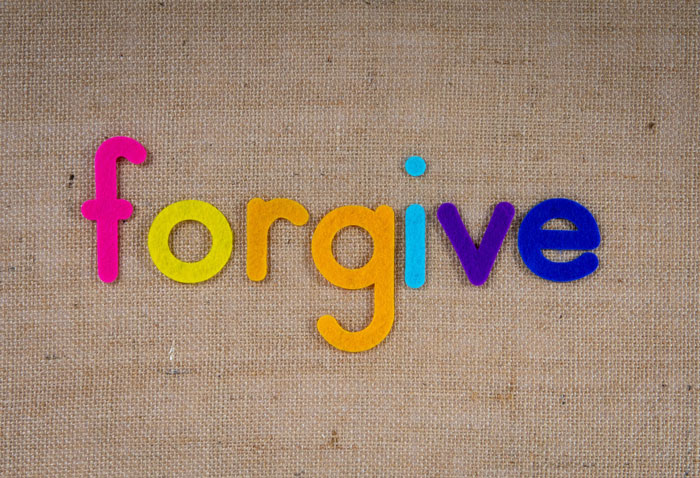Forgiveness is one of the basic underlying aspects of human life and the development of the soul. When you have been hurt, but the initial pain subsides, you are left with nothing but a memory and a feeling. If they persist, and sometimes grow in intensity, giving birth to anger, enmity, hostility, these emotions filling your soul will be feeding upon your power and well-being. By letting them out of your system you will gain peace of mind and inner strength.
What Is Forgiveness?
To forgive means to be kind and merciful, and return mercy for hurt not trying to judge whether the other fellow is deserving or not. Forgiveness doesn’t include exonerating the offender or making pretence the offence never happened. Forgiving can’t be done by executing some technique or other. It can take little time or evolve for a long period, be accomplished quickly or through several stages; oftener than not, it is not linear.
The act of forgiveness may not include:
- exonerating or explaining away the offender’s actions;
- letting the offender know that they are forgiven;
- stopping to have residual feelings about the offending situation;
- leaving no place for further work on the relationship;
- believing that things are finally settled;
- putting the incident out of your mind completely;
- continuing to socialize with the offender;
… thinking that forgiveness is done for the offender’s sake.
When you decide to forgive, you thereby come to terms with the offensive situation, regain your grasp of reality, and resolve to live it down. It is your inner necessity in order to regain touch with your energies and re-balance your attitude to life in general.
Forgiving is beneficial
Psychological studies reveal that forgiveness brings about manifest spiritual benefits. The purging effect of forgiveness is known to set back anxiety, depression, and the symptoms of PTSD. Besides, it helps battle outbursts of rage.
Start Learning to Forgive

Begin by explaining to yourself that you shouldn’t disparage your offender(s) vocally. It doesn’t mean that you are obliged to speak well of them, but you will feel forgiveness every time you curb your mean streak consciously when you mention them.
The good side of your nature can be nurtured little by little in your daily encounters, pausing to listen attentively to somebody who wants to be heard or being pleasant to people without any reason at all. These unexpected and uncalled-for acts of love are great for practicing empathy and compassion. In fact, small portions of forgiveness are required on a daily basis, and giving them out mindfully builds up a beneficial practice.
Tackle your painful feelings
Firstly, you should have a clear understanding of who your offender is and how he hurt you. Be honest; see if it was really an unfair and unwarranted jab.
Secondly, try and put things in perspective. Look at those who surround you – your family, partners, colleagues, neighbors (don’t forget about yourself), and consider them in terms of hurting you. As you took offences, your inner hurt grew, and it needs to be recognized. You are likely to discover that you need to do a lot of forgiving and realize what issues hurt you most.
If you find that you are incapable of working all this out alone, arrange a date with a therapist. No matter what approach you have chosen, provide for yourself an environment that is restful and conducive to soul searching.
Acknowledge your feelings of anger and hurt

For many people, it appears to be easier to pretend they have not been hurt and put the offensive situation out of mind in order to avoid wallowing in anguish. As it is, this is the wrong attitude, because you don’t deal with these feelings; they may recur bringing back with them all the tortures of the past.
No Harm
Arrange and let out your feelings in a productive manner. You may have been grossly mistreated and feeling indignant, but bear in mind that you mustn’t be malicious to others. Make sure you have calmed down somewhat before you lash out. Maybe it would be a good idea to pour out your feelings to a third party.
Leave It Behind You
See it like this: your affront(s) have been and gone, your reality is now quite different. There’s absolutely no need to drag these memories along, letting them dirty your present. Maybe you have even started a new stage in life, surrounded by other people, doing other things. Look at it like a story read some time ago: there were good and bad characters, and they all were necessary for drama. But there is no need to remember the story.
Be Like Water

If you go on taking things hard, imagine that you have become liquid. You can flow like water, you are not solid, but trickling into every part of your soul. Also, you can wash everything hard and painful out of your heart. When an offender comes to your mind, flow around him or her, or maybe flow into them. So you are able to penetrate their inner selves, understand their feelings and share their experiences. It can change your attitude to them wholly, and maybe you will enter a new phase of the relationship.
Empathy and Compassion Are the Keys
Do you know your offending friends (or relative) well at all? There surely are details that you don’t know, and they might be indicative of their real nature – or tell a tale of their old wounds. Knowing their wounds and soft spots can make you feel empathic towards these people. To begin with, picture them as a little kid, vulnerable and in need of love and care. Did they receive enough of those? Or are they still suffering, and it makes them want to hurt others, or they can’t help hurting?
It could happen that you will be able to learn all the facts about the offender, his or her struggles through childhood and adolescence, but if not, you can make it up, imagining a soft-hearted individual who hurts because he or she was hurt. Naturally, your own wound will not pass, but the understanding of a circle of suffering might alter your attitude for good.
When one realizes that everybody was wounded and may still be smarting, one finds it in the heart the strength to forgive.
Change Your Viewpoint
Try and shift your viewpoint so you can observe the whole offending situation from the offender’s position. This will enable you to see the situation in a slightly different light, and it may well take the edge off your anger. Another idea is to compose a letter that the offender might have written to you. When you have stepped out of the role of the victim you will surely feel stronger and more self-confident.
Make your Sufferings Meaningful

Our sufferings, even if we are not aware of it, have meaning, which is to be discovered. We don’t suffer for nothing; these unpleasant periods bring something into our lives, often positive things that usually remain unacknowledged. It is better if we find out about all the consequences of our sufferings and ponder over them.
When you think of your inner wounds, try to see what you gained from them.
Discovering the meaning behind suffering is not a cure, don’t expect immediate alleviation, but what it grants is the reasons that impregnate all events of our lives.
Search for the Positive
Not allowing yourself to remain under the shadow of pain, concentrate on the individual who wounded you and write down everything positive about your relationship. Since you were piqued by the individual’s remarks he or she means something to you, and you value their opinion. So, re-balance the relationship after sustaining a blow.
Ceremony

Supposing your offender caused you so much pain that you no longer want to remain their friend. Arrange some sort of ceremony to mark your break-up. It can be a small bonfire of their letters or a picture of them going away from your life.
Forgive Yourself
It may well turn out that you are the person whom you need to forgive. You have figured out that it was you who was in the wrong in the situation and, in consequence, you wounded somebody. Think whether you had a real choice at the time – if you didn’t, well, you couldn’t have acted in a different manner. There was no other way the situation could have come off.
If you succeeded in wiping off the hurt and leave the past behind you, you will be rewarded by an overpowering sense of relief and freedom. Your future life will be brighter and more contented for that, free of unnecessary bitterness and angst. It is an inspiring feeling.











